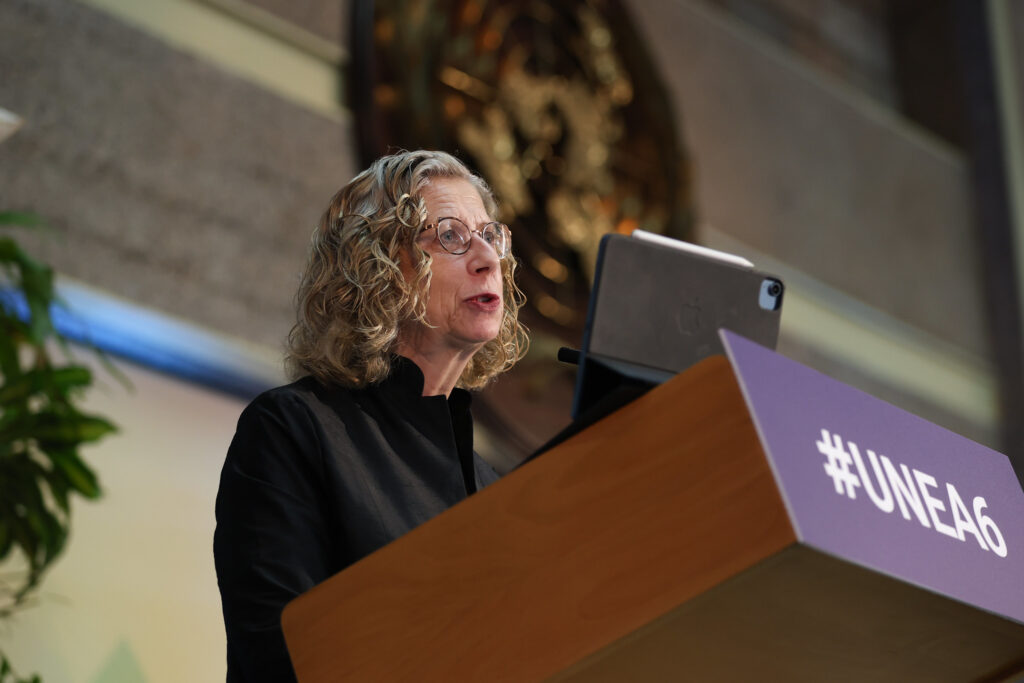- Weeklong UNEA-6 talks in Nairobi will focus on negotiating resolutions on critical issues such as nature-based solutions, highly hazardous pesticides, land degradation, drought, and the environmental aspects of minerals and metals.
- UNEA-6 talks will see countries consider a total of 19 resolutions aimed at spurring more ambitious multilateral environmental action.
- The UN Environment Assembly plays a crucial role in setting priorities for global environmental policies and developing international environmental law.
Ministers of environment and leaders from over 180 nations gathering in Nairobi for the sixth session of the United Nations Environment Assembly (UNEA-6) are calling on the urgent need for environmental multilateralism to tackle the triple planetary crisis of climate change, nature loss, and pollution.
This year’s assembly, taking place between February 25 and March 1st, will focus on negotiating resolutions on critical issues such as nature-based solutions, highly hazardous pesticides, land degradation, drought, and the environmental aspects of minerals and metals.
As the world’s highest decision-making body on the environment, the UN Environment Assembly plays a crucial role in setting priorities for global environmental policies and developing international environmental law.
With all 193 UN Member States as members, the assembly meets biennially to address pressing environmental challenges and define the work of the UN Environment Programme (UNEP).
Resolutions at UNEA-6 talks particularly timely for Africa
The discussions and resolutions at UNEA-6 talks are particularly timely as Africa and the world grapple with unprecedented environmental challenges. Climate change is accelerating, biodiversity is declining at an alarming rate, and pollution is posing serious threats to human health and ecosystems.
Addressing these challenges requires coordinated global action and strong commitments from all countries.
One of the key focuses of this year’s assembly is nature-based actions, which are increasingly recognized as effective tools for addressing climate change and biodiversity loss.
These solutions, which include restoring forests, protecting wetlands, and sustainable agriculture practices, can provide multiple benefits, including carbon sequestration, biodiversity conservation, and improving livelihoods for communities.
The assembly will also address the issue of highly hazardous pesticides, which pose serious risks to human health and the environment. By discussing strategies to reduce the use of these pesticides and promote safer alternatives, UNEA-6 talks aim to protect both people and the planet.
“We are living in a time of turmoil. And I know that in this room, there are people who are, or who know, those deeply affected by this turmoil. Our response must demonstrate that multilateral diplomacy can deliver,” Leila Benali, President of UNEA-6 and Minister of Energy Transition and Sustainable Development for the Kingdom of Morocco.
“As we meet here in 2024, we must be self-critical and work towards inclusive, networked and effective multilateralism that can make a tangible difference to people’s lives.”
“We must also include voices beyond government, of youth, indigenous peoples and local communities, by focusing on issues of gender and human rights, and leaving no one behind,” she added.
“And today, and at this UN Environment Assembly, we must accelerate multilateral action to strengthen the environmental foundation of sustainable development.”
Read also: Kenya’s bold move to foster growth through the circular economy
Resolutions on circular economy, and climate justice among others
As the impacts of climate change intensify and the threat of species extinction looms large, UNEA-6 talks are poised to address these pressing issues. With pollution remaining a leading causes of premature death in Africa and across the world, UNEA-6 talks will see countries consider a total of 19 resolutions aimed at spurring more ambitious multilateral environmental action.
These resolutions cover a wide range of critical issues, including the circular economy, solar radiation modification, climate justice, sound management of chemicals and waste, and sand and dust storms.
According to Inger Andersen, Executive Director of UNEP, the goal of these resolutions is to lay the groundwork for more effective, inclusive, and sustainable environmental policies that can help mitigate the effects of climate change and protect biodiversity globally.
In her address, Andersen highlighted the urgent need for countries to set aside political differences by tapping into the “Nairobi spirit of consensus building” and focus on the common goal of ensuring a sustainable future for the planet.
She stressed the importance of agreeing on resolutions that will boost multilateral action and secure intergenerational justice and equity.
UNEA-6 talks have drawn more than 7,000 delegates from 182 UN Member States, including over 170 ministers. Under the theme of “effective, inclusive, and sustainable multilateral actions to tackle climate change, biodiversity loss, and pollution,” the assembly will bring together Heads of State, government representatives, civil society, and the private sector to discuss and collaborate on solutions to these critical challenges.
“UNEA-6 comes at a time when the world is also called upon to accelerate the implementation of the UN 2030 Agenda if we are to stay course on sustainable development. Unfortunately, for millions in the developing regions of the world, including here in Africa, poverty still remains a daily reality while economic inequality is increasing globally,” said Soipan Tuya, Cabinet Secretary for the Environment, Climate Change and Forestry for the Republic of Kenya.
“It is against this backdrop that the world will be looking to us here in Nairobi this week to renew hope. And hope we must provide,” she added.
Deliver impactful planetary action
Overall, a series of leadership and multi-stakeholder dialogues, along with more than 30 official side events and associated events, are expected to set the stage for enhanced future global and regional coordinated efforts by thUe United Nations, Member States, and partners to deliver impactful planetary action.
UNEA-6 assembly will also underscore the significance of cooperation with multilateral environmental agreements (MEAs) – international agreements addressing critical global or regional environmental issues – which serve as essential instruments of international environmental governance and law.
A full day will be dedicated to strengthening the convergence of actions and sharing experiences, while also raising the profile of MEAs.
In a world facing unprecedented environmental threats, UNEA-6 assembly serves as a beacon of hope, offering a platform for global leaders to come together, forge partnerships, and take bold actions to protect our planet for future generations.











